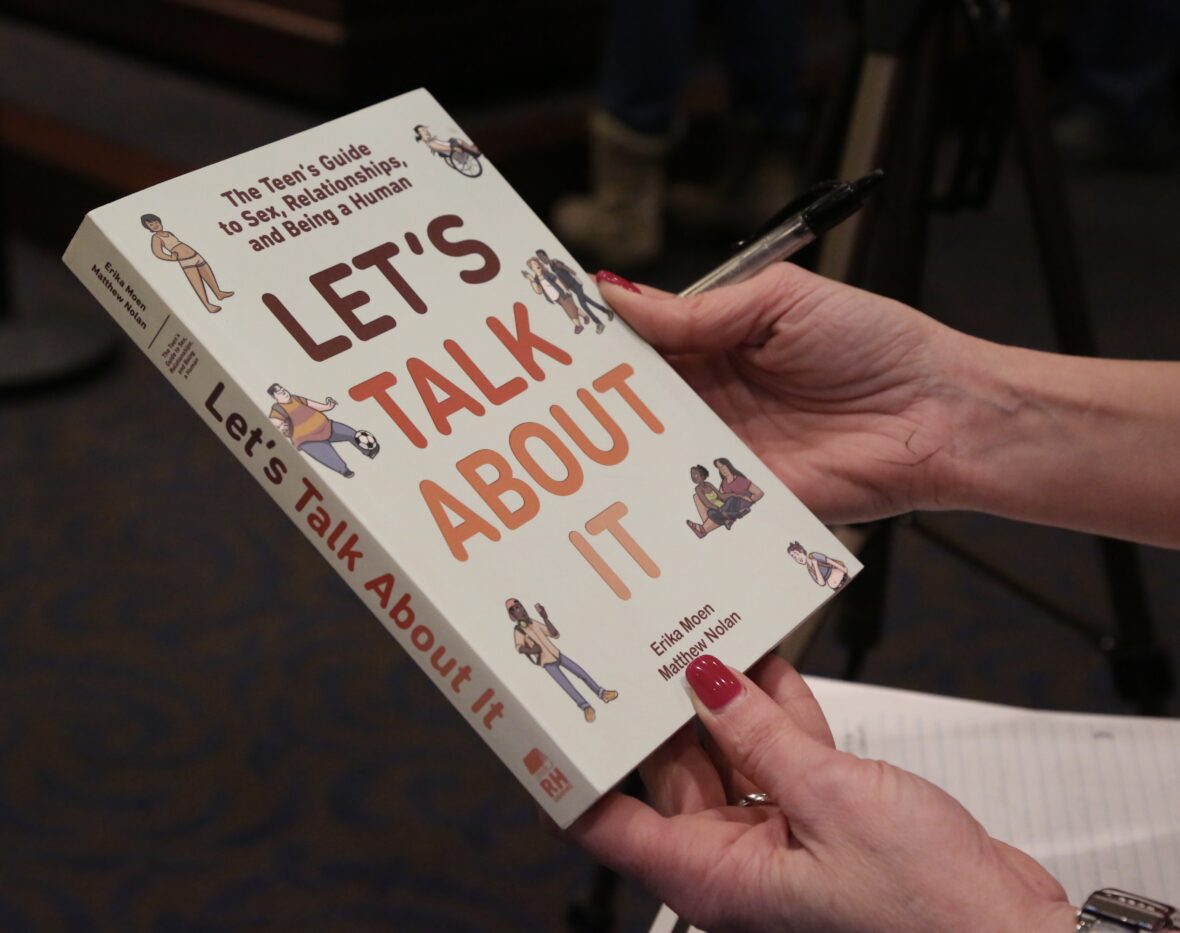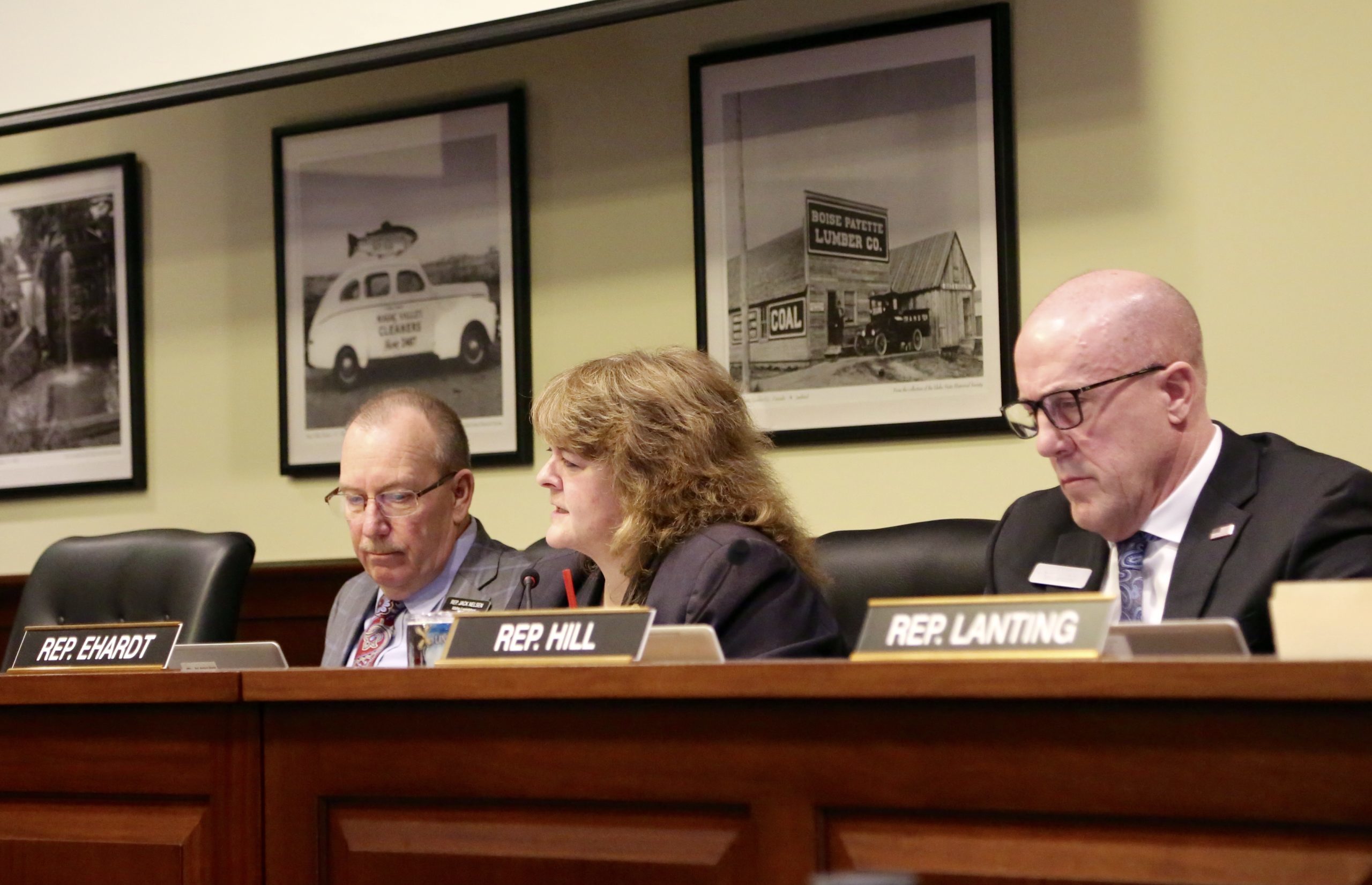The House Education Committee grappled with two library bills Wednesday morning. And after nearly three hours of heated testimony, both bills remain with the committee.
The two bills are vastly different, but chase similar goals. House Bill 139 bans “harmful materials” from libraries and imposes fines on libraries that violate the ban. House Bill 227 requires libraries to implement policies for selecting and removing materials, and for parents to question materials or restrict their child’s access. HB 227 does not codify any civil or criminal penalties.
After a winding discussion, committee members voted 9-8 to hold HB 139, and adjourned Wednesday before voting on HB 227. Committee Chair Julie Yamamoto, R-Caldwell, told EdNews she doesn’t know when, or if, the bills will come back for further discussion.
“We’ll see,” she said.
Committee narrowly votes to hold first bill
HB 139, brought forward by Rep. Jaron Crane, R-Nampa; Sen. Cindy Carlson, R-Riggins; and Blaine Conzatti of the conservative Idaho Family Policy Center, would prohibit school and public libraries from distributing “harmful materials” to minors. The bill outlines, often in graphic detail, what qualifies as a harmful material.
Materials that have “serious literary, artistic, political, or scientific value for minors” are excluded from the bill, based on the values of the community.

Libraries that violate the ban could face a $10,000 fine.
“This is not a book ban bill,” Crane told the committee Wednesday. Carlson agreed, before distributing excerpts of graphic materials from her list of obscene books to committee members.
Primarily concerned about the impacts of pornography on children, Carlson said her goal is to penalize institutions, not librarians.
But some Idahoans had concerns that the bill’s language would open up libraries to unwarranted litigation. And most opponents said the issue is one of local control — both for local library boards and school districts to monitor, and for parents to police their children.
Sherry Scheline, a librarian from Donnelly, said a $10,000 fine would have catastrophic impacts on her library, which has an operating budget of under $70,000.
“Librarians cannot afford this legal fee,” she said. “We can say that it’s for the institution…I am my institution and so are my librarians.” Scheline denied that the books on Carlson’s list are in her library, but suggested passages of the Bible (which can be found in the collection) would be considered harmful based on the definitions in the bill.
Gregory Taylor, a school librarian from Boise, said every student should be able to find representation in books, regardless of gender, sexual orientation, ethnicity or body size. Removing books for everyone based on personal objection, he said, is a slippery slope. “The right book at the right time for the right kid can literally save a life.”

Most bill supporters echoed concerns about pornography.
Heather Greenman of Post Falls accused her library of “grooming” children with hundreds of allegedly pornographic books in its collection. The library board, she said, refused to remove the objectionable books in its collection because they aren’t violating state law.
Greenman attempted to read passages from an allegedly obscene book, but stopped at Yamamoto’s objection.
Over an hour of public testimony culminated in a winding committee discussion. Several members said the bill’s issues outweighed its merit. Reps. Greg Lanting, R-Twin Falls, and Dan Garner, R-Clifton, questioned how “literary value” could be determined.
After reading books that some parents in his district found objectionable, Lanting said he didn’t find problems. Garner wondered why the bill’s sponsors would make an exception for To Kill a Mockingbird, but attack modern books with similar graphic content. “Are we going to say something has literary value after a certain cutoff date?”
But others disagreed.
“I am appalled that there is this type of discussion,” said Rep. Judy Boyle, R-Midvale. “There is nothing wrong with this bill.”
After a vote to amend the bill narrowly failed, the committee voted 9-8 to hold the bill.
Reps. Judy Boyle, R-Midvale; Lance Clow, R-Twin Falls; Ron Mendive, R-Coeur d’Alene; Barbara Ehardt, R-Idaho Falls; Tony Wisniewski, R-Post Falls; Dale Hawkins, R-Fernwood; Hill, R-Eagle; and Elaine Price, R-Coeur d’Alene, voted against the motion.
Committee adjourns before voting on second bill
Brought forward by Rep. Jack Nelsen, R-Jerome, HB 227 would require school boards, public library boards and public charter schools to create policies for selecting and removing materials from libraries by Oct. 1.
Under the standards for selection section, the bill requires that libraries prohibit any materials that are “harmful to minors,” as defined in the legislation. The policy should also outline a process for district parents and guardians to challenge materials, and a process for parents and guardians to restrict their child’s access.
The bill also requires that minors get parental permission before obtaining a public library card.

Nelsen said the bill codifies what most libraries are already doing.
Several individuals who testified for HB 139 spoke against HB 227.
Nina Beesley of Rathdrum told the committee her local library already has policies in place, but hasn’t removed the “sexually explicit” books she’s advocated against for two years. Beesley quickly got heated at the podium and was ushered to her seat by Statehouse security.
Former state representative and current policy fellow for the Idaho Freedom Foundation Ron Nate said HB 227 has no teeth, and accused the committee of voting “against children” on the previous bill.
“You should be ashamed,” he said.
Charity Myser of Hauser said obscene materials in her library are “disturbing to the soul” and a “shock to the conscience.”
Destinie Hart opposed the bill because she thinks it’s unnecessary. Hart is a trustee on the Meridian Library Board, which has come under fire for alleged obscene materials in its libraries. A petition to dissolve the Meridian Library District has floated around in recent weeks, and will receive a public hearing in March.
“There is no pornography in our libraries,” Hart said. “There is no obscene material in our libraries.”
Other Idaho librarians came out in support. Lance McGrath, President of the Idaho Library Association and librarian at the College of Idaho, said the bill codifies best practices and puts the responsibility where it should be — with parents.

Committee discussion on HB 227 mimicked the testimony. Rep. Barbara Ehardt, R-Idaho Falls, scorned the bill for not penalizing librarians and said it’s “watered down” compared to HB 139. She later asked the committee to hold the bill until March 25.
But the committee did not get around to a vote. Upon the request of Rep. Elaine Price, R-Coeur d’Alene, the committee adjourned before taking action, concluding a three-hour morning meeting.
